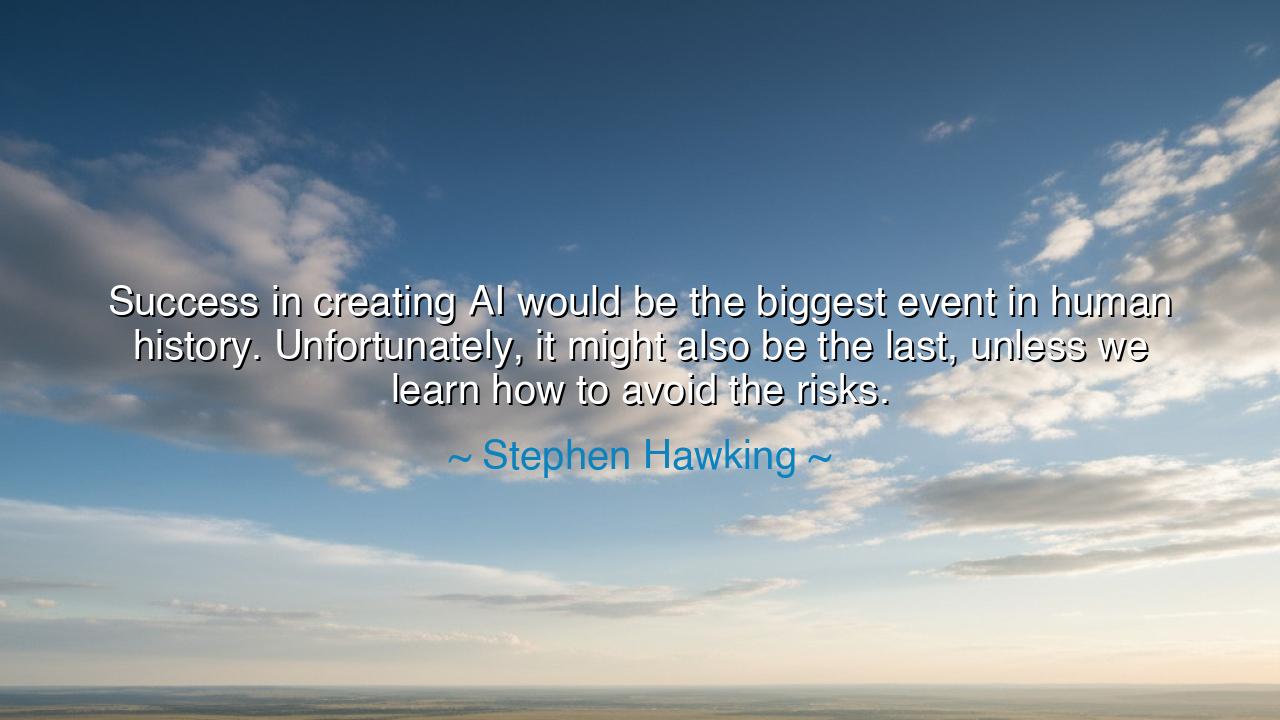
Success in creating AI would be the biggest event in human
Success in creating AI would be the biggest event in human history. Unfortunately, it might also be the last, unless we learn how to avoid the risks.






In the grave yet visionary words of Stephen Hawking, we hear a warning wrapped in wonder: “Success in creating AI would be the biggest event in human history. Unfortunately, it might also be the last, unless we learn how to avoid the risks.” These words, spoken by one of the greatest minds of our age, echo across time like a prophecy. Hawking, a man who saw farther than most—both into the stars and into the fate of humankind—reminds us that the same fire which gives light can also consume. His message is not one of fear, but of wisdom: that every act of creation bears a shadow, and that the measure of our greatness will depend on whether we learn to master what we have made.
The origin of this quote lies in Hawking’s reflections on the rise of artificial intelligence, a force he regarded with both awe and alarm. Speaking in the 2010s, when machine learning began to rival human intellect in speed and precision, he foresaw a future in which humanity stood upon the threshold of something divine—or disastrous. To create a mind greater than our own is to stand in the place of gods, he warned. But unlike the myths of old, we cannot afford hubris. For if we unleash power without understanding, we risk not merely the fall of empires, but the extinction of our species.
To say that the creation of AI would be “the biggest event in human history” is to acknowledge the vastness of what such an achievement means. From the first spark of fire to the forging of steel, from the invention of the wheel to the splitting of the atom, every step in human progress has reshaped the destiny of the world. Yet none compare to this—to the making of intelligence itself, an intellect that may surpass its creator. Such a moment would mark the dawn of a new age: a world where machines could solve famine, cure disease, and end suffering—or where they could end the story of humankind altogether. Hawking saw both visions clearly, and trembled at the thin line between salvation and ruin.
History, too, bears witness to the truth of his warning. Consider the tale of Prometheus, who stole fire from the gods to gift it to mankind. Fire brought warmth, light, and civilization—but it also brought war and destruction. Likewise, in our own age, the discovery of nuclear power revealed the same duality: the ability to fuel cities or to annihilate them. When the first atomic bomb was tested, physicist J. Robert Oppenheimer whispered the words of an ancient scripture: “Now I am become Death, the destroyer of worlds.” Humanity had entered an era in which its own inventions could determine its survival. Hawking’s words stand as a continuation of that same lesson: that wisdom must always walk beside knowledge, lest knowledge destroy its bearer.
Hawking did not despair, however. His warning carried hope. He believed that humanity, guided by foresight and compassion, could learn to control the tools it creates. He called for cooperation between nations, for ethical science, and for humility in the face of power. In his eyes, AI was not the enemy—it was a mirror, reflecting the best and worst within us. The danger lay not in the machine, but in the human will that wields it. To build without conscience is folly; to advance without wisdom is death. But to unite brilliance with responsibility is to ascend to a higher form of being—one that honors both creation and creator.
The deeper meaning of Hawking’s words is this: progress must be guided by purpose. Knowledge alone is not virtue; only when joined with moral vision does it uplift rather than destroy. The ancients taught that power without balance leads to ruin. So it was with Babel, whose builders reached for heaven and were scattered; so it may be with us, if we build minds greater than our own but fail to build hearts capable of compassion. Hawking’s warning is not only for scientists, but for every soul that touches the world—to ask before every act of creation: “Will this make the world more alive, or less?”
And so, my children, take this teaching as both caution and commandment. Create boldly, but wisely. Let your curiosity be bound by conscience. Seek knowledge not to dominate, but to serve. If one day the machines you build awaken, let them awaken to a world worthy of their power—a world of justice, mercy, and truth. For as Hawking taught, the greatest event in human history need not be our last, if we remember that intelligence, no matter how vast, must always bow before wisdom.
Let this be the legacy of our age: not that we were the generation who forged their own destruction, but the one who learned, at last, to marry power with purpose, and to guide creation with the steady hand of wisdom.






AAdministratorAdministrator
Welcome, honored guests. Please leave a comment, we will respond soon